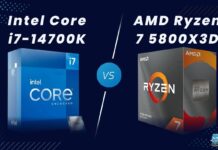The Ryzen 7 7800X3D is a gaming processor designed by AMD with next-gen AMD 3D-V cache technology for low latency and the best possible gaming performance. In contrast, the Core i9-13900K is among the top processors of Intel’s latest (13th) generation, which delivers brilliant gaming and productivity performance. In the Ryzen 7 7800X3D vs Core i9-13900K comparison, we will deeply examine the features and gaming skills of the two processors.
Key Takeaways
- In gaming performance, the Core i9-13900K blows out the Ryzen 7 7800X3D by a margin of about 7.4%.
- However, the Ryzen 7 7800X3D is around 78% more power efficient than the Core i9-13900K. Regarding thermal efficiency, the capabilities of both processors are nearly identical.
- The MSRP of AMD’s latest Ryzen 7 7800X3D is $449, whereas Intel Core i9-13900K has an MSRP of $589 to $599.
Ryzen 7 7800X3D Vs Core i9-13900K
Comparison Table
| Feature | AMD Ryzen 7 7800X3D | Intel Core i9-13900K |
| Architecture | Zen 4 | Raptor Lake Hybrid architecture |
| Socket | AM5 | FCLGA 1700 |
| No. of Cores | Total: 8 | Total Cores: 24 (P-Cores 8, E-Cores 16) |
| No. of Threads | 16 | 32 |
| Base Clock | 4.20 GHz | P-core base: 3.00 GHz, E-core base: 2.20 GHz |
| Boost Clock | Max Turbo: Up to 5.0GHz | P-core boost: 5.40 GHz, E-core boost: 4.30 GHz, Max Turbo: 5.80 GHz |
| Integrated Graphics | AMD Radeon Graphics | Intel UHD Graphics 770 |
| iGPU Base Clock | 400 MHz | 300 MHz |
| iGPU Boost Clock | 2200 MHz | 1650 MHz |
| CPU Memory Support | DDR5 only | DDR4 and DDR5 |
| Memory Capacity | 128GB | 128GB |
| L1 Cache | 512KB | 64K (per core), Total: 1024KB |
| L2 Cache | 8MB | 2MB (per core), Total: 32MB |
| L3 Cache | 96MB | 36MB Intel Smart Cache |
| TDP | 120 watts | Base Power: 125 W, Turbo Power: 253 W |
| Launch Date | 4/6/2023 | Q4’2022 |
| Launch Price | $449 | $589.00 – $599.00 |
| Motherboard | Best Motherboards For Ryzen 7 7800X3D | Best Motherboards For i9-13900K |
| RAM | Best RAM For Ryzen 7 7800X3D | Best RAM For Core i9-13900K |
| Cooler | Best CPU Coolers For Ryzen 7 7800X3D | Best CPU Coolers For Core i9-13900K |
Architecture
The Core i9-13900K features Intel’s hybrid Raptor Lake core architecture, and the Ryzen 7800X3D offers AMD’s Zen 4 microarchitecture.
In reference to Raptor Lake, Intel says, “Our new 13th Gen Intel Core processor isn’t just a chip. It’s a multiverse where everyone can have it all and be it all”. It is made for gamers that desire the highest performance to play the most recent games while managing other responsibilities.
With a double-digit IPC margin, AMD Zen 4 outperforms its predecessor (Zen 3) and further solidifies AMD’s reputation for innovative design, faultless execution, and award-winning “Zen” architecture delivery. AMD claims, “The Zen 4 CPUs offer up to 57% more efficient content creation in V-Ray Render than the competition”.
Also Read: Ryzen 9 7900X3D Vs i9-13900K
Integrated Graphics
The inbuilt graphics of the Ryzen 9 7800X3D are AMD’s Radeon Graphics, whereas those of the Core i9-13900K are Intel’s UHD Graphics 770.
AMD Radeon Graphics is famous for its outstanding performance and cutting-edge features. For instance, AMD’s FreeSync technology makes gaming more fluid by synchronizing a monitor’s refresh rate with the graphics card’s frame rate. The Radeon graphics have two cores, a base frequency of 400 MHz, and a boost clock of up to 2200 MHz.
Intel UHD Graphics 770 is a strong graphics card that is effective while performing everyday tasks like web browsing, watching movies, and using office productivity apps. UHD Graphics 770 has 2 multi-format codec engines and 32 execution units. Its base frequency is 300 MHz, and Its boost clock can reach a maximum of 1.65 GHz.
Related Article: Ryzen 9 7950X3D Vs Intel i9-13900K
CPU Clock
The Intel i9-13900K’s performance cores run at a base clock of 3.00 GHz, while its efficiency cores run at 2.20 GHz. The base frequency of the Ryzen 9 7800X3D is 4.2 GHz. Thus, the Ryzen 9 7800X3D might overtake the Core i9-13900K in terms of performance for basic tasks.
Regarding the turbo clock, the maximum clock speeds of the efficiency and performance cores on the Intel i9-13900K are 4.30 GHz and 5.4 GHz, respectively. The maximum turbo frequency of the Core i9-13900K is up to 5.8 GHz, compared to 5.0 GHz max for the Ryzen 9 7800X3D.
These processors are also unlocked for overclocking for extraction of extreme performance. According to the boost clock, the Core i9-13900K may transcend the Ryzen 7 7800X3D by 16%.
Also Read: Does Overclocking Reduce CPU Lifespan?
Memory
The Core i9-13900K has 128GB memory and supports DDR4 and DDR5. This processor can run memory at a maximum speed of 3200 MT/s for DDR4 and up to 5600 MT/s for DDR5 memory. It has two memory channels and an ultimate bandwidth of 89.6 GB/s.
On the other hand, the Ryzen 9 7800X3D only works with DDR5. Its capacity is also 128GB. The Ryzen 7 7800X3D also has two memory channels, an 83.2 GB/s bandwidth, and a memory speed of up to 5200 MT/s.
Must Read: DDR4 Vs. DDR5 Ram
Furthermore, both processors support ECC memory. However, the Ryzen 7 7800X3D requires support mobo support for this.
TDP And Maximum Temperature
Considering the thermal design power, the Ryzen 7 7800X3D has a default TDP of 120 W. In contrast, the Core i9-13900K has a processor Base Power of 125 W and a maximum turbo power of 253 W.
There is a difference of 133 watts in maximum powers of the Ryzen 7 7800X3D vs Core i9-13900K. The Core i9-13900K’s risen power may help it deliver greater performance but will also lead to more power consumption and, eventually, a higher running cost.
Regarding the CPU temperature, the maximum operating temperature for the Ryzen 7 7800X3D is up to 89°C, and the Core i9-13900K is up to 100°C. These two processors do not offer any thermal solution. A user needs to purchase a separate CPU cooler for these processors. Nonetheless, the Core i9-13900K features Intel’s Thermal Monitoring Technologies to combat extreme temperatures.
If you are having issues with CPU overheating, read our guide on How To Lower CPU Temperature?
CPU Socket
The Ryzen 7 7800X3D employs an AMD AM5 socket (LGA 1718), whereas the Core i9-13900K has an Intel’s FCLGA 1700 socket.
AMD’s premier AM5 (LGA 1718) socket offers dual-channel DDR5 memory and cutting-edge connectivity capabilities. This sophisticated desktop socket supports up to 24 PCIe 5.0 lanes. The socket connects to the motherboard with its 1718 protruding pins, boosting data rate and cooling.
Must Read: AM5 vs. AM4
The flip-chip land grid array 1700 (FCLGA 1700) socket needs zero insertion force. It was released in November 2021. This advanced desktop socket supports dual-channel DDR5 memory and up to 28 PCIe 5.0 lanes. It attaches to the motherboard with its 1700 projecting pins and increases data speed and ventilation.
Also Read: LGA 1200 Vs LGA 1700: All Differences.
Caches
When we look at the level 1 cache of the two processors, the Ryzen 7 7800X3D has 512KB caches, while the Core i9-13900K has a 1MB L1 cache due to its higher P-cores count.
The level 2 cache of the R7 7800X3D is 8MB, while the total L2 cache of the Core i9-13900K is 32MB.
Regarding the specialized level 3 cache, the Core i9-13900K has a 36MB Intel Smart Cache. In contrast, the Ryzen 7 7800X3D features a 96MB AMD 3D-V Cache specialized for low latency and lofty gaming performance.
Core i9-13900K Vs Ryzen 7 7800X3D: Gaming Benchmarks
After inspecting their technical specifications, let’s discuss the gaming abilities of the Ryzen 7 7800X3D vs Core i9-13900K. Here, we will analyze the skills of these processors in 10 demanding games at 1080p resolution. The system used to conduct the benchmarks had the following specifications.
Gaming Rig
- CPU 1: AMD Ryzen 7 7800X3D
- Motherboard 1: Gigabyte X670E AORUS MASTER
- CPU 2: Intel Core i9-13900K
- Motherboard 2: ASUS ROG Strix Z790-E Gaming
- GPU: Nvidia GeForce RTX 4090 24GB
- RAM: G.SKILL Trident Z5 RGB 32GB DDR5 6000MHz CL32
- SSD: 2 x Samsung 970 Evo M.2 2280 1TB
- Power Supply: CORSAIR RM850i 850W
- CPU Cooler: be quiet! Dark Rock Pro 4
A Plague Tale: Requiem
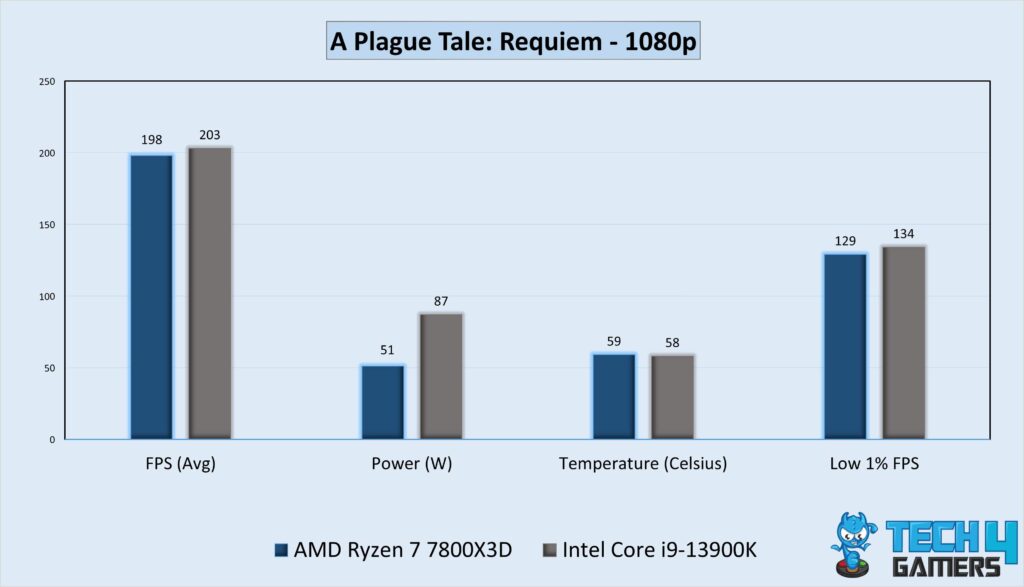
- In A Plague Tale: Requiem at 1080p, the Core i9-13900K performed 2.52% or 5 FPS better than the Ryzen 7 7800X3D.
- The Ryzen 7 7800X3D delivered an average frame rate of 198 FPS, while the Core i9-13900K delivered an average of 203 FPS.
- During the gameplay, the Core i9-13900K ran at 87 watts of power, while the Ryzen 7 7800X3D operated at a much lower power of 51 watts.
- The CPU operating temperature of the Ryzen 7 7800X3D was 59°C, whereas the Core i9-13900K operated at 58°C.
Counter-Strike: Global Offensive
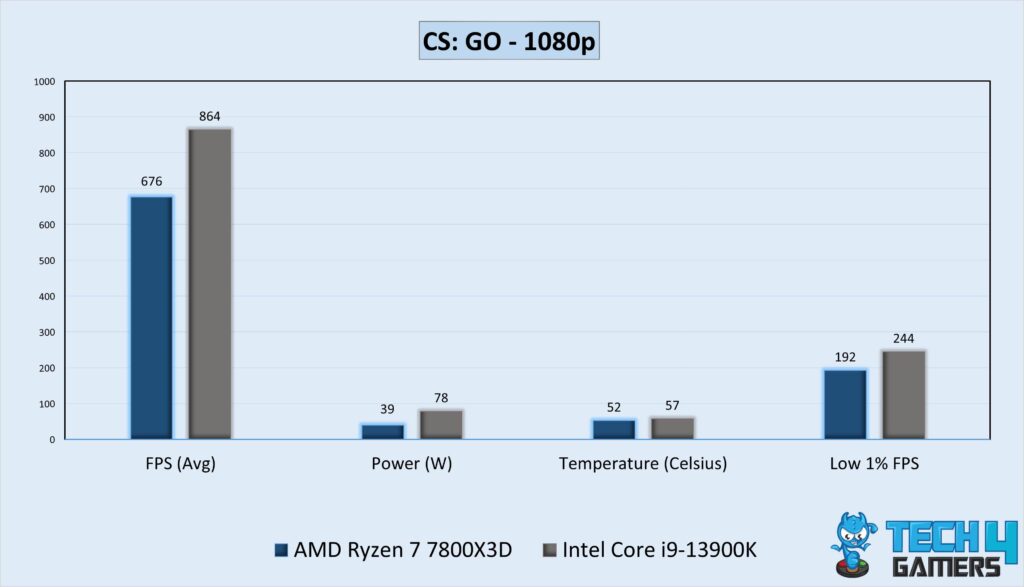
- During Counter-Strike: Global Offensive, the performance of the Core i9-13900K was 27.8% better than the Ryzen 7 7800X3D.
- The Core i9-13900K produced an average frame rate of 864 FPS compared to the Ryzen 7 7800X3D’s 676 FPS.
- Regarding power consumption, the Core i9-13900K used 78 watts, whereas the Ryzen 7 7800X3D used only 39 watts.
- The Ryzen 7 7800X3D’s operational temperature in CS: GO was 59°C, compared to the Core i9-13900K’s 58°C.
Cyberpunk 2077
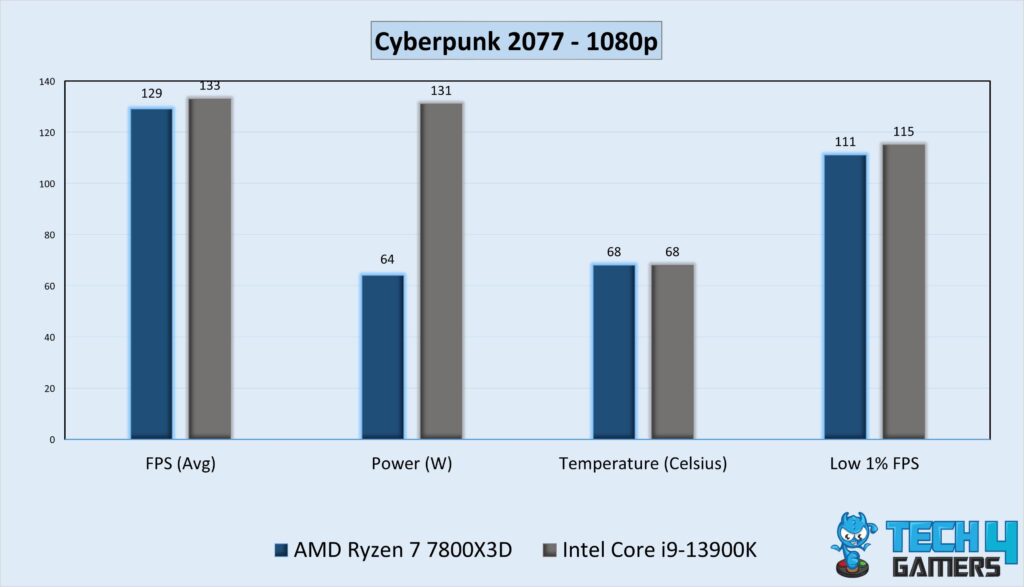
- In Cyberpunk 2077, the Core i9-13900K outperformed the Ryzen 7 7800X3D by 4 FPS or 3.1%.
- Compared to the Ryzen 7 7800X3D’s average frame rate of 129 FPS, the Core i9-13900K delivered an average of 133 FPS.
- The Core i9-13900K required 131 watts of power, whilst the Ryzen 7 7800X3D only used 64 watts.
- Taking into account the CPU temperature, the Ryzen 7 7800X3D vs Core i9-13900K both ran at the same temperature of 68°C.
Forza Horizon 5
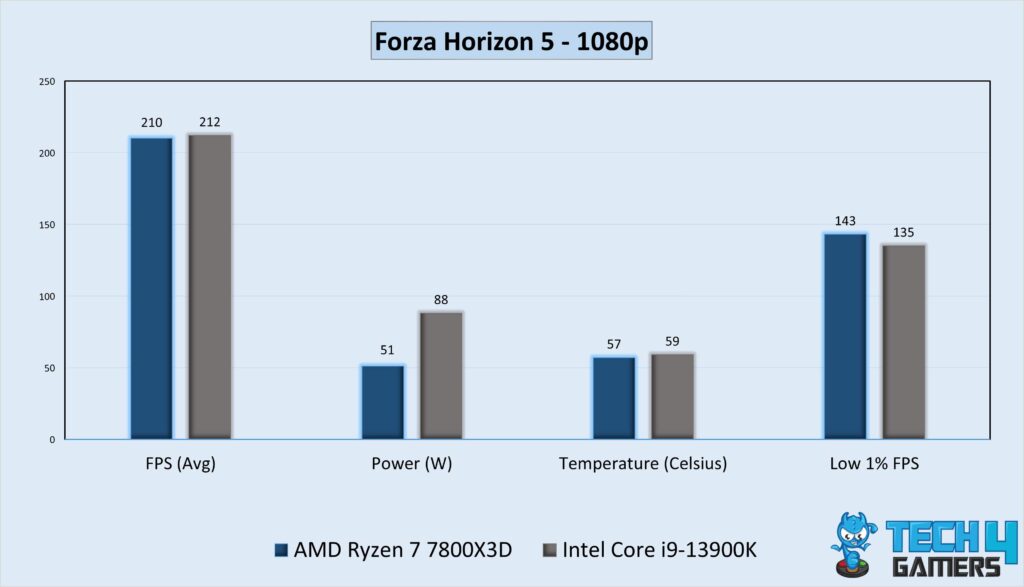
- The Core i9-13900K outscored the Ryzen 7 7800X3D by 2 FPS or 1.0% greater performance in Forza Horizon 5.
- In this game, the Core i9-13900K produced an average frame rate of 212 FPS, whereas the Ryzen 7 7800X3D produced 210 FPS.
- The Ryzen 7 7800X3D only utilized 51 watts of power compared to the Core i9-13900K’s 88 watts.
- During Forza Horizon 5, the Ryzen 7 7800X3D’s operating temperature was 57°C, while the Core i9-13900K was 59°C.
Hitman 3
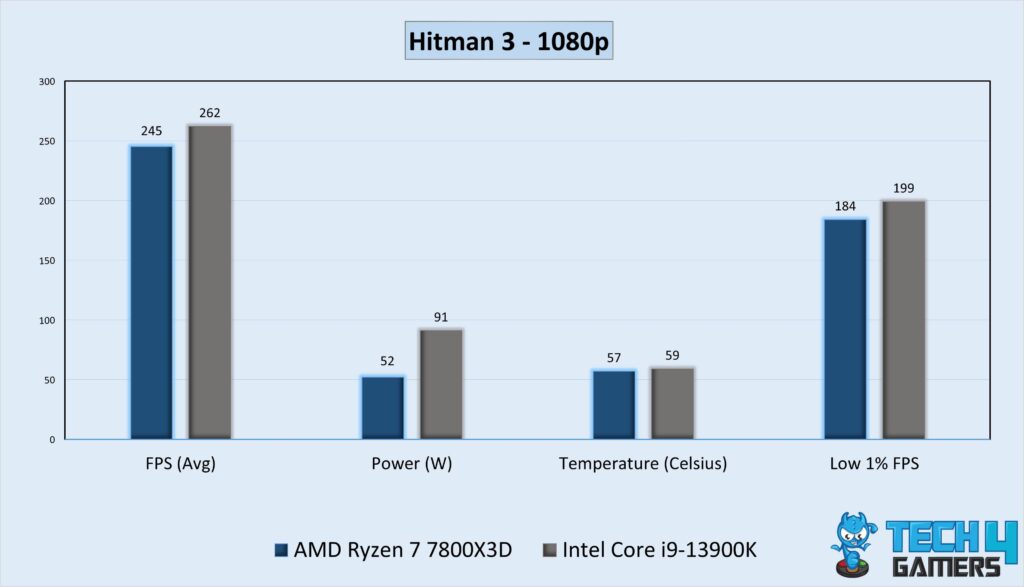
- In Hitman 3, the Core i9-13900K defeated the Ryzen 7 7800X3D by 17 FPS, or 6.9% more performance.
- The Core i9-13900K achieved an average frame rate of 262 FPS, whereas the Ryzen 7 7800X3D achieved 245 FPS.
- Compared to the Core i9-13900K’s 91 watts power consumption, the Ryzen 7 7800X3D only used 52 watts.
- The operating temperatures of the Ryzen 7 7800X3D and Core i9-13900K during the gameplay were 57°C and 59°C, respectively.
Hogwarts Legacy
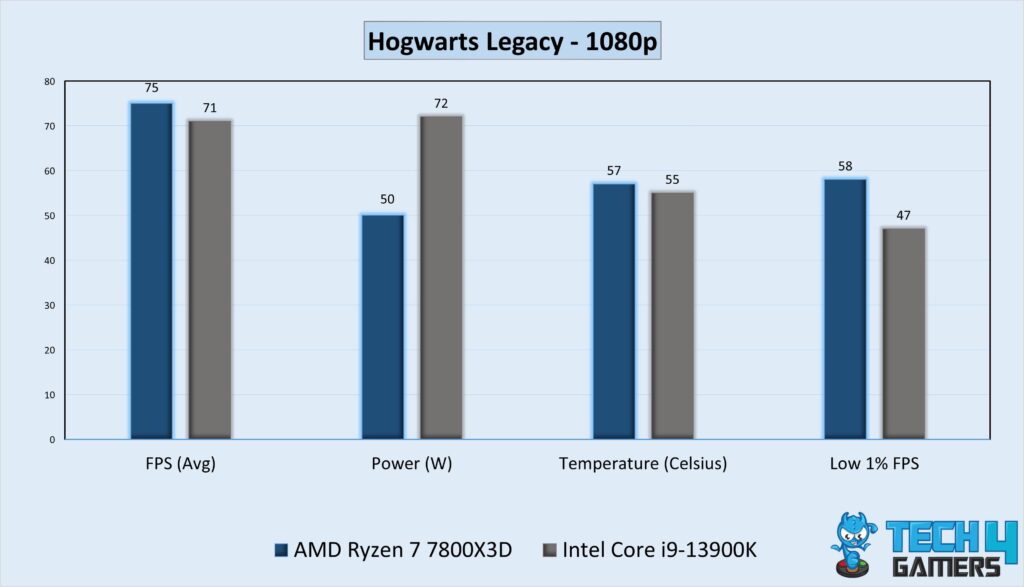
- During Hogwarts Legacy, the performance of the Ryzen 7 7800X3D was 4 FPS or 5.6% better than the Core i9-13900K.
- While the Ryzen 7 7800X3D only managed 75 FPS, the Core i9-13900K could only make up an average frame rate of 71 FPS.
- The Ryzen 7 7800X3D only utilized 50 watts compared to the Core i9-13900K’s power consumption of 72 watts.
- Regarding the temperature, the Ryzen 7 7800X3D operated at 57°C, whereas the Core i9-13900K executed Hogwarts Legacy at 55°C.
Horizon Zero Dawn
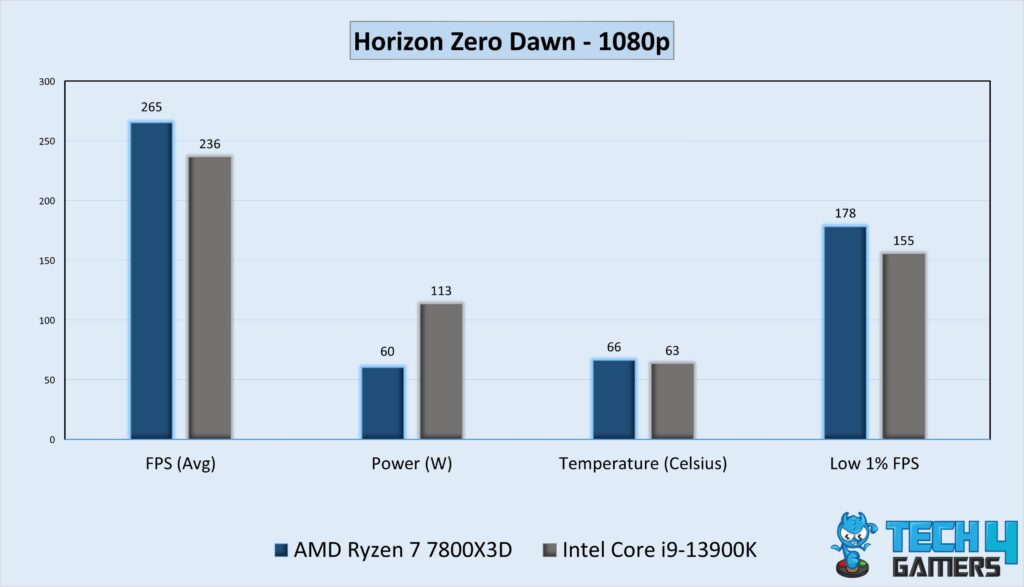
- The Ryzen 7 7800X3D outperformed the Core i9-13900K by 29 frames per second or 12.3% in Horizon Zero Dawn.
- The Core i9-13900K could only achieve an average frame rate of 236 FPS, while the Ryzen 7 7800X3D made a brilliant delivery of 265 FPS.
- Compared to the Core i9-13900K’s power consumption of 60 watts, the Ryzen 7 7800X3D only used 123 watts.
- During this gameplay, the Core i9-13900K ran at 63°C while the Ryzen 7 7800X3D worked at 66°C.
Microsoft Flight Simulator
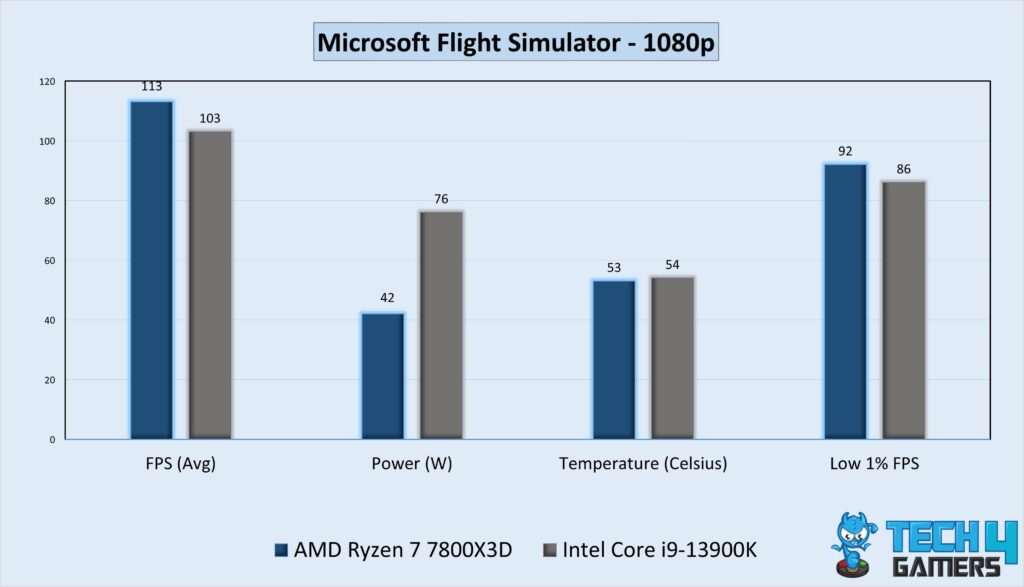
- In Microsoft Flight Simulator, the Ryzen 7 7800X3D achieved a performance lead of 10 frames per second or 9.7% over the Core i9-13900K.
- The Ryzen 7 7800X3D delivered a fantastic 113 FPS average frame rate, whereas the Core i9-13900K could only manage an average of 110 FPS.
- During Microsoft Flight Simulator, the Ryzen 7 7800X3D consumed 42 watts of power, while the Core i9-13900K consumed 76 watts.
- In this game, the Core i9-13900K ran at 54°C, whereas the Ryzen 7 7800X3D operated at 53°C.
Returnal
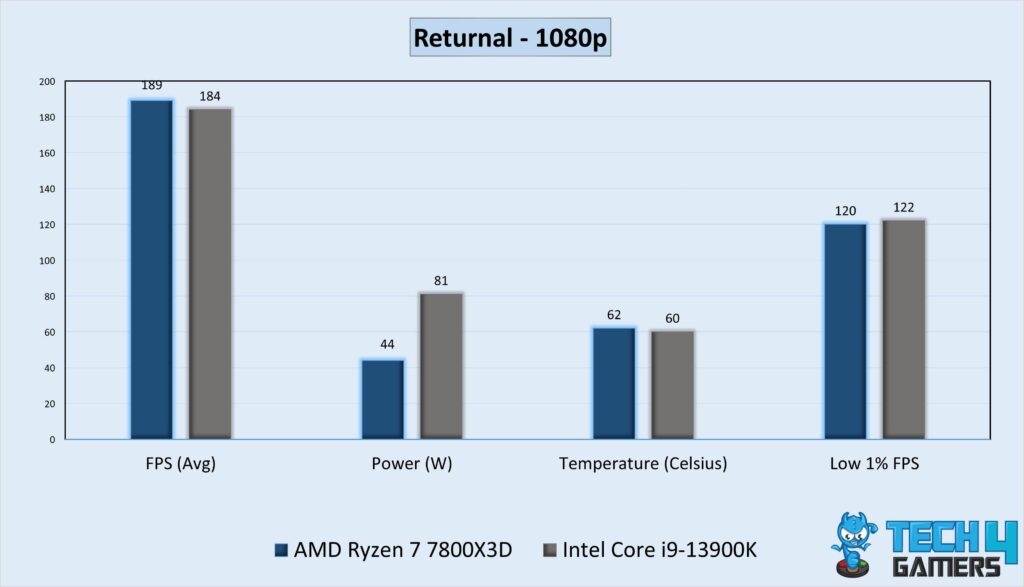
- The Ryzen 7 7800X3D outperformed the Core i9-13900K by 5 frames per second or 2.7% during Returnal.
- During the gameplay, the Core i9-13900K generated an average of 184 FPS, while the Ryzen 7 7800X3D produced a 189 FPS average.
- The Ryzen 7 7800X3D used 44 watts of power, while the Core i9-13900K ran at 81 watts.
- Regarding the CPU temperature, the Core i9-13900K served at 60°C, whereas the Ryzen 7 7800X3D ran at 62°C.
Spider-Man: Miles Morales
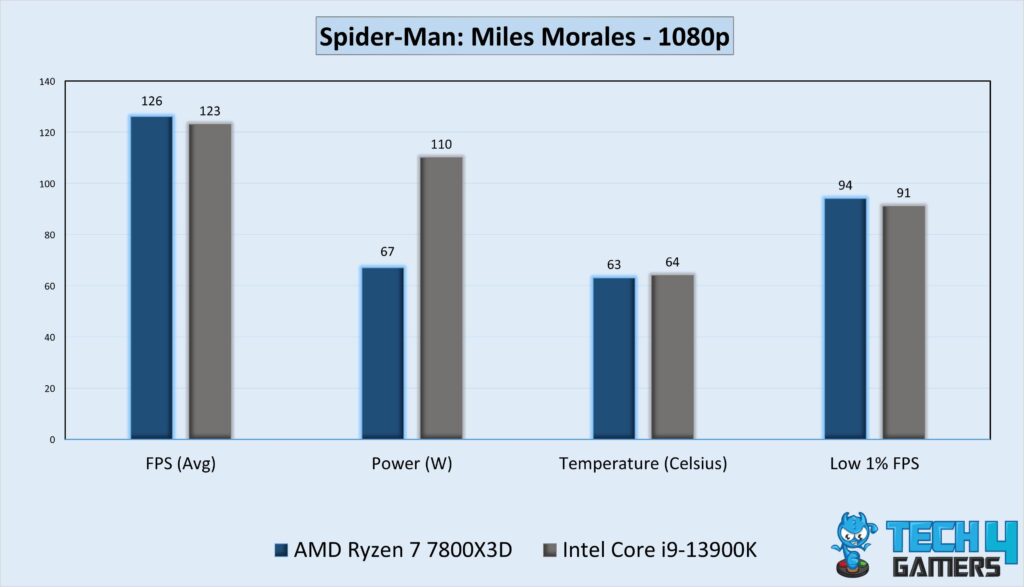
- In Spider-Man: Miles Morales, the Ryzen 7 7800X3D defeated the Core i9-13900K by averaging 3 more FPS or 2.4% greater performance.
- The Core i9-13900K earned an average frame rate of 123 FPS, while the Ryzen 7 7800X3D turned 126 FPS on average.
- During this gameplay, the Core i9-13900K performed by using 110 watts of power, while the Ryzen 7 7800X3D only required 67 watts.
- While playing Spider-Man: Miles Morales, the Core i9-13900K fled at 64°C, whereas the Ryzen 7 7800X3D functioned at 63°C.
Overall Gaming Stats
Let us now analyze the overall gameplay parameters of the Ryzen 7 7800X3D vs Core i9-13900K to determine the average performance and efficiency of the two processors.
Performance

In terms of the overall frame rate in the above-mentioned games at 1080p resolution, Intel Core i9-13900K conquers the gaming performance with an advantage of 7.4% more profitable over the Ryzen 7 7800X3D. According to calculations, the Core i9-13900K implemented 1080p games at an average frame rate of 239.1 FPS, while the exact figure in the case of the Ryzen 7 7800X3D is 222.6 FPS.
If we figure out the 1% low performance of the two processors, again, the Core i9-13900K leads the competition. The overall gaming 1% low frame produced by the Ryzen 7 7800X3D was 130.1 FPS, and the Core i9-13900K yielded 132.8 FPS.
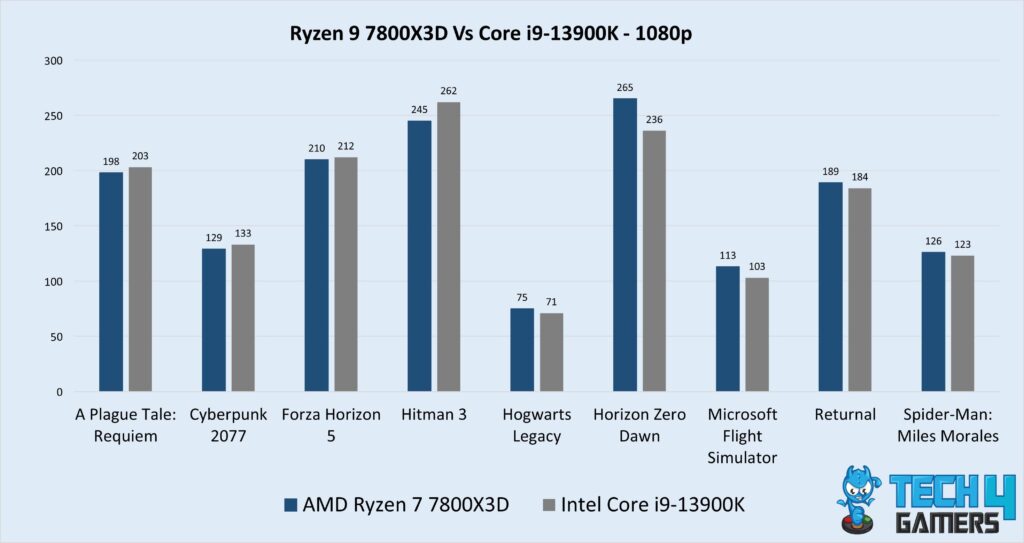
Let’s see the performance of the Ryzen 7 7800X3D vs Core i9-13900K in each game separately. The Core i9-13900K dispatched higher frame rates in the first five games discussed above, and the Ryzen 7 7800X3D carried performance led in the last five games. However, the Core i9-13900K had frame rates that were comparatively so higher that when we compare overall performance, it is ahead by 7.4%.
Related Article: Intel i9-13900k Vs Ryzen 9 7950X [Gaming Benchmarks]
Power Efficiency

It’s vital to discuss how much power a CPU uses while gaming. The average power consumption of the Ryzen 7 7800X3D in the above-discussed games was only 52 watts. In contrast, the Core i9-13900K had a relatively higher consumption of 92.7 watts.
As per the above figures, the Ryzen 7 7800X3D is 78.3% more power efficient than the Core i9-13900K.
Must Read: Gaming PC Power Usage: How Much Is Required?
Thermal Efficiency
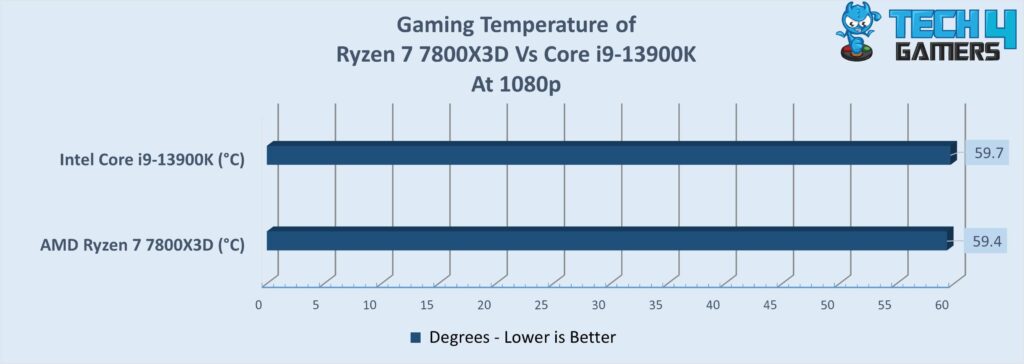
When it comes to the gaming temperature, both processors had intense combat. The average temperature of the Ryzen 7 7800X3D was 59.4°C, while the Core i9-13900K operated at 59.7°C. There is no discernible difference between the thermal efficiencies of the two processors.
Find Help at: CPU Temperature While Gaming – Complete Guide
Price And Availability
Before choosing a CPU, consider its price and availability. AMD launched the Ryzen 7 7800X3D with a retail price of $449, and Intel launched the Core i9-13900K with an MSRP of $589 – $599. As per MSRP, the Ryzen 7 7800X3D costs about $150 less than the Core i9-13900K.
However, the prices of processors change with time and the launch of new models. Since the Ryzen 7 7800X3D is just launched, most sellers demand about $500 to $550. In contrast, the Core i9-13900K was launched more than six months ago, and its market price today is about $570 to $580.
Regarding availability, the Core i9-13900K is readily available in markets, while the Ryzen 7 7800X3D is not easily accessible. And the sellers are demanding extra money for the processor at this time.
Also Read: Intel i9-13900k Vs Ryzen 9 7900X
Which One Should You Go For?
Following the thorough comparison of the Ryzen 7 7800X3D vs Core i9-13900K, let us pick the one.
Our unbiased opinion is that if your focus is only on top gaming performance irrespective of cost, then the Intel Core i9-13900K would be the best pick for you for its brilliant performance. It offers 24 cores plus 32 threads and a 7.4% better gaming performance than the Ryzen 7 7800X3D (8 cores plus 16 threads).
However, considering the performance-to-price ratio and the running cost, the AMD Ryzen 7 7800X3D proves reasonable with its 78.3% higher power efficiency.
Pros And Cons
| CPU | Pros | Cons |
|---|---|---|
| AMD Ryzen 7 7800X3D |
|
|
| Intel Core i9-13900K |
|
|
Must Read: How To Choose A CPU [Things To Know]
No, AMD Ryzen 7 7800X3D offers 8 cores and 16 threads. The Ryzen 7 7800X3D has a maximum boost frequency of up to 5.0 GHz, while the Core i9-13900K has a turbo boost frequency of 5.80 GHz. The gaming performance of the Ryzen 7 7800X3D is outstanding, but it does not beat the gaming skills of the Intel Core i9-13900K.Common Questions Answered
Thank you! Please share your positive feedback. 🔋
How could we improve this post? Please Help us. 😔
[Comparisons Specialist]
I’m a passionate computer hardware expert specializing in CPUs and GPUs. With a lifelong curiosity for hardware and extensive hands-on experience, I provide valuable insights, practical advice, and in-depth analysis on these components. Engaging with the hardware community, I exchange knowledge and stay at the forefront of technological advancements.
Get In Touch: [email protected]



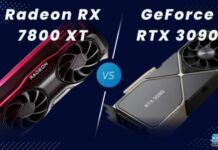
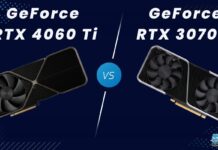
![Core i5-13400 Vs Ryzen 5 7600 [We Tested 9 Games] Core i5-13400 Vs Ryzen 5 7600](https://tech4gamers.com/wp-content/uploads/2023/04/Comparison-1-218x150.jpg)
![RTX 4070 Ti Vs RTX 3080 Ti [Gaming Benchmarks + Overall]](https://tech4gamers.com/wp-content/uploads/2023/01/RTX-4070-TI-VS-3TX-3080-TI-218x150.jpg)
